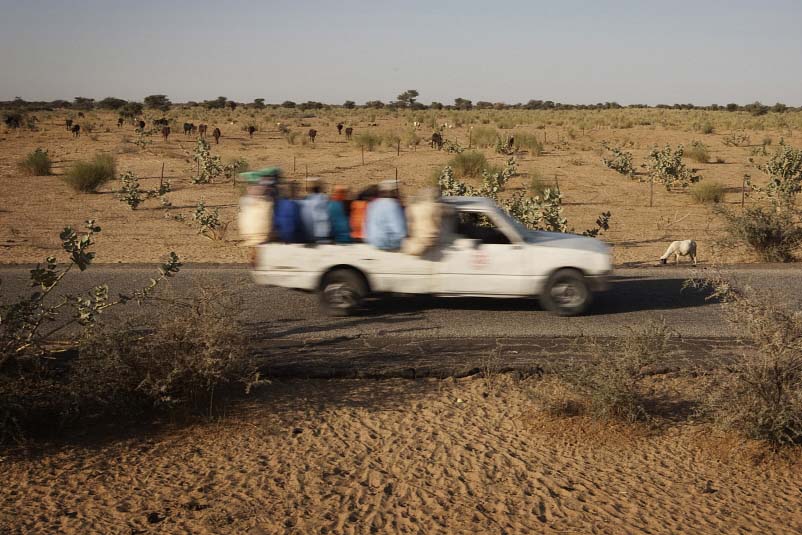By: Max Martin
Send to a friend
The details you provide on this page will not be used to send unsolicited email, and will not be sold to a 3rd party. See privacy policy.
Almost a quarter of all usable land on Earth is degraded, affecting the livelihoods of more than 1.2 billion poor villagers, according to a report presented at a recent UN conference on desertification. Land is said to be degraded if it has a long-term loss of function and productivity due to natural causes or human activities. This often forces people to migrate.
Of late, migration caused by land degradation — especially in the context of climate change — has been projected by the mainstream media as a pressing problem, with migrants cast as troublemakers.
Tabloid headlines have screamed about the danger that “millions of climate change migrants” will “overwhelm” Europe.
Yet the truth is that scientists do not fully understand how many migrants climate change will produce. This is because other factors, social and economic ones, also contribute to people’s movements.
What society needs is more research that helps us understand how these factors interact so that it can combat media scaremongering.
Failed past predictions of how many people will be forced to move by climate change have already shown our current lack of understanding in this area. For example, a mid-1990s prediction that environmental change would force 50 million people into migration by 2010 has not come true. [1] Since then, a map based on this figure on the website of a centre collaborating with the UN Environmental Programme (UNEP) has been quietly withdrawn and UNEP disowned it.
More recently, reports from other organisations have produced other estimates — one predicted there would be 700 million environmental migrants by 2050, [2] and another put the figure at 300 million. [3]
“Tabloids that cry themselves hoarse about the prospect of millions of environmental or climate migrants invading Europe are ignoring the realities. What is needed is interdisciplinary research that takes into account these subtleties and their local contexts.”
Max Martin, University of Sussex
It seems that often such figures are mere ‘guesstimates’.
To improve our knowledge in this area we first need to understand the challenge. The problem with collecting robust evidence on why people migrate stems from difficulties in linking such movements directly back to their causes. This is tough because migration occurs in complex and dynamic situations that involve mutually interacting natural and social factors.
Part of the solution would be more research projects that cover the different disciplines concerned, including economics, social sciences and climate science. It would also be important to include local perspectives. For example, such projects would appreciate — unlike some newspapers — that, since travelling costs money, not all migrants come from the poorest sections of society and want to compete for western jobs.
Although some serious policy reports still do not recognise these nuances and continue to warn of migrants bringing about “internal and cross-boundary social, ethnic, and political strife”, [4] there are signs that this kind of understanding is emerging in places.
Many academics are pointing out that the inaccurate migratory estimates of the 1990s and 2000s reflect an inability to understand the complex dynamics of migration. A 2011 report commissioned by the UK government, for instance, recognises that, while population mobility is a common household livelihood strategy in places exposed to environmental change, it may involve permanent, temporary and seasonal movements into, outside and within these regions [5].
Tabloids that cry themselves hoarse about the prospect of millions of environmental or climate migrants invading Europe are ignoring these realities. What is needed is interdisciplinary research that takes into account these subtleties and their local contexts.
Max Martin is a doctoral candidate at the University of Sussex, United Kingdom, researching on climate-related migration. The views expressed are his own.
References
[1] Myers, N. and Kent. J. Environmental Exodus: An Emergent Crisis in the Global Arena (Climate Institute, June 1995)
[2] Warner, K. et al. In Search of Shelter: Mapping the Effects of Climate Change on Human Migration and Displacement (The Center for International Earth Science Information Network, May 2009)
[3] Christian Aid. Human Tide: The real migration crisis (Christian Aid, May 2007)
[4] Millennium Ecosystem Assessment. Ecosystems and Human Well-being: Desertification Synthesis. (World Resources Institute, Washington, DC 2005)
[5] Foresight, Migration and Global Environmental Change (The Government Office for Science, October 2011)














